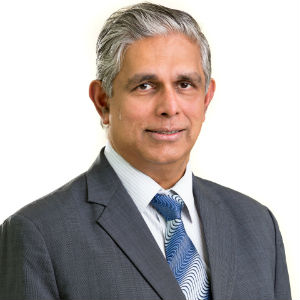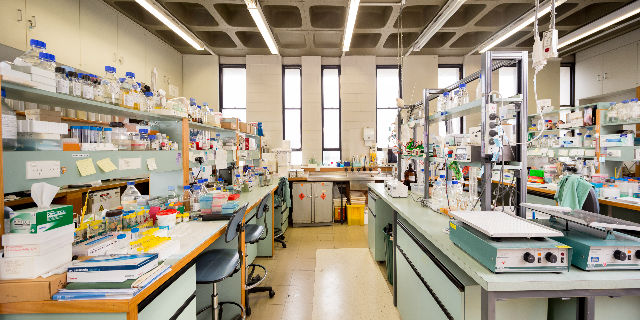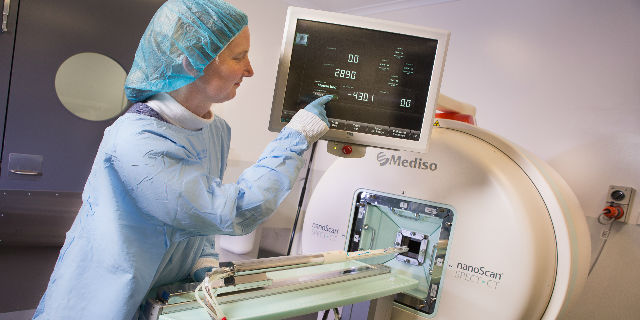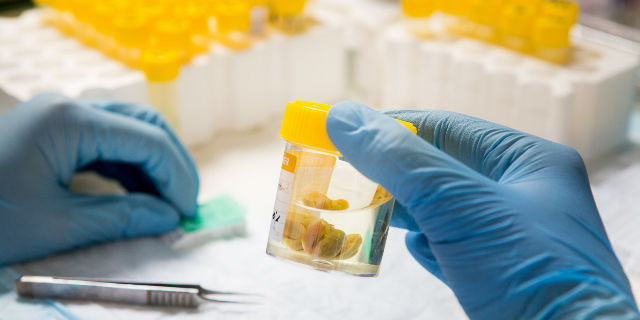Surgery at Austin Health
About Us
The primary clinical and research focus of the Austin Health Precinct is in the area of Hepatobiliary and Pancreatic Surgery and Liver Transplantation. The clinical unit of the Department of Surgery is a leading tertiary referral centre for surgical diseases in HPB predominantly in the fields of pancreatic cancer and liver malignancy.
In addition, surgical education is a cornerstone of the departmental philosophy, being the largest General Surgery training hub and delivering Masters programs in Surgical Education and Surgical Sciences. Educational Research is also gaining increasing importance within the departmental philosophy.
Our Academic Lead
 Professor Vijayaragavan Muralidharan PhD, FRACS, M Surgical Ed, MBBS(Hons), B Med Sci. the Chair, The University of Melbourne, Department of Surgery at Austin Hospital. Prof Muralidharan is the Professor of Surgery and Precinct Head of the department of Surgery, Austin Precinct as well as the Director of HPB and Liver Transplant Surgery Unit, Austin Health.
Professor Vijayaragavan Muralidharan PhD, FRACS, M Surgical Ed, MBBS(Hons), B Med Sci. the Chair, The University of Melbourne, Department of Surgery at Austin Hospital. Prof Muralidharan is the Professor of Surgery and Precinct Head of the department of Surgery, Austin Precinct as well as the Director of HPB and Liver Transplant Surgery Unit, Austin Health.
Prof Muralidharan (Murali) is an academic HPB surgeon with clinical expertise in HPB Surgery and liver transplantation, academic focus in translational research on circulating biomarkers and invested in the delivery of high-quality surgical training, regional and rural surgical services and systems improvements within healthcare to benefit the community. He commenced undergraduate medicine in Sri Lanka and during the civil strife transferred to and graduated from Monash University in 1991. He completed general surgical training at the Alfred Hospital and a Doctorate of Philosophy at Monash University before undertaking a two-year fellowship in HPB and Liver Transplantation in Birmingham UK.
He was appointed full time lecturer to The University of Melbourne Department of Surgery and consultant surgeon in the HPB & Transplantation Unit at Austin Health in 2004.
Prof Muralidharan established the BEACON (Biomarker EnhAncement for Clinical Outcomes & translatioN) Research Collaborative working closely with the Translational Genomics & Epigenomics Group to engage clinicians in translational research with circulating biomarkers. His research activities are supported by grants from the MRFF, Cancer Council, Austin Medical Research Foundation and the University of Melbourne. The strategic direction of his research is personalizing therapy for HPB malignancies and liver transplantation by circulating biomarkers and mass data analysis to enable predictive accuracy and response assessment.
Murali is extensively involved in surgical education and examinations at both undergraduate and post graduate levels. He completed The University of Melbourne Masters in Surgical Education to complement his commitment to education. He designed and implemented the Austin Surgery Education Program which has gained national recognition by GSA and RACS. He is the hub supervisor for General Surgery training for Austin Northern Training Hub (ANTH) with more than 50 general surgical registrars. He was Chair of the VIC/TAS Training Committee (2014 to 2017) and Deputy Chair, Board in General Surgery (2018-2022). As member of the Strategic Plan Working Party of the Board in General Surgery he designed and implemented the new research scheme for General Surgery training.
Murali established a trainees’ education committee (ANSA) at ANTH to foster leadership and ownership by trainees of their education as well as the first Victorian trainee led research collaborative (VERITAS). In conjunction with his participation in CTANZ, he has fostered the growth of trainee research collaboratives and empowered trainee led research in clinical and educational areas at both national and international levels.
Key Research Areas
Research in the department encompasses basic science research, translational research and clinical research in liver and pancreatic malignancies, liver regeneration and liver transplantation. Tumour biology, novel biological therapies and molecular mechanisms for response assessment, liver regeneration and tumour growth inhibition are major areas of interest and expertise.
Lead Researchers
Mr Michael Fink
Senior Lecturer,
Mr Michael Fink has research interests related to liver transplantation. These include optimising the use of donation after cardiac death donors, ex vivo perfusion of liver grafts, liver transplant waiting list mortality risk, organ allocation, post-transplant mortality risk and complications of liver transplantation.
Email: mafink@unimelb.edu.au
Professor Vijayaragavan Muralidharan
Surgeon, Researcher, Supervisor of Surgical Training
Professor Vijayaragavan Muralidharan has a Masters of Surgical Education with a particular interest in teaching methods. He is the Supervisor of Surgical Training at Austin Health and coordinates a program for over 25 accredited trainees. His major research interests are in, circulating bio markers in organ health and prognostic parameters in surgery of colorectal liver metastases.
Email: v.muralidharan@unimelb.edu.au
Associate Professor Mehrdad Nikfarjam
Liver, Pancreas and Biliary Surgeon, Senior Lecturer on the Hepatic, Pancreatic and Biliary / Transplant unit.
Associate Professor Mehrdad Nikfarjam has a major research interest in pancreatic cancer with a particular interest in underlying signaling mechanisms. His research focuses on the therapeutic efficacy of targeting pathways down-stream of K-ras mutations, particularly P21-Activated kinase (PAKs) in the treatment of pancreatic cancer.
Email: m.nikfarjam@unimelb.edu.au
Dr Marcos Perini
Senior Lecturer in Surgery,
Dr Marcos Perini has a research interest in Biology of Colorectal Liver Metastases with a particular focus on the role of lymphatics in this disease.
Email: marcos.perini@unimelb.edu.au
Professor Debra Nestel
Professor of Surgical Education, Co-Director of the Graduate Studies in Surgical Education.
Professor Debra Nestel's research interests include qualitative investigations of surgical education, professional identity formation, faculty development and simulation to support learning for professional practice.
Email: dnestel@unimelb.edu.au
Dr Katrina Walsh
Research Fellow
Dr Walsh’s interests are in exploring the potential benefits of combining promising inhibitors of angiogenesis and lymphogenesis to improve the potential efficacy of immunotherapies in the treatment of colorectal cancer metastases in liver.
Email: kawalsh@unimelb.edu.au
Dr Hong He
Senior Research Fellow
Dr He has been interested in the research area of signaling pathways in cancer cell growth and metastasis, and targeted therapy of cancer. She is among the pioneers of developing inhibitors of p21-activated kinase 1 (PAK1) for the treatment of Ras-driven cancers including colorectal and pancreatic cancers. Her discovery of the role of PAK1 in tumour immune response makes it attractive target in the combination treatment with immunotherapy.
Email: hong.he@unimelb.edu.au
Research Groups
Liver Group
Research Group Leader - Professor Christopher Christophi
Cancer Biology Research Group
Research Group Leader - Professor Graham Baldwin
Spinal Biology Laboratory
Research Group Leader - Dr Gerald Quan
Facilities
Research and education in The University of Melbourne Department of Surgery at Austin Health is supported by excellent facilities.
The Department maintains its own research laboratories located in the Lance Townsend Building and in the Kronheimer Building at Austin Health. Students, supervisors and hospital personnel are co-located to facilitate interaction and collegiality. There is a new Bioresources facility for animal work, and the newly refurbished medical library. The department has a large lecture theatre and meeting rooms.
Additional facilities are available in the Education Precinct of the Clinical School on level four of the Austin Tower. There are excellent laboratory facilities available for students within the Department of Surgery, including laboratories for tissue culture, FACS, fluorescence microscopy, histology, digital microscopy and image analysis, HPLC, molecular biology, radioimmunoassay, protein chemistry, Immunohistochemistry and cell transfections. In addition, other equipment sited within laboratories in other departments are also available for students to use, including new platforms for analysis of biochemical interactions and peptide chemistry.

Laboratory - Austin Health

nanoScan® SPECT/CT - equipment used in collaboration with Olivia Newton-John Cancer Research Institute and ACRF Centre for Translational Cancer Theraeutics and Imaging.

Research at Austin Health
Contact Us
Executive Assistant to Professor Vijayaragavan Muralidharan
Julie Miller:
Ph: +61 3 9496 3670
Email: j.miller@unimelb.edu.au
Research Co-ordinator
Professor Christopher Christophi
Ph: +61 3 9496 5466
Email: c.christophi@unimelb.edu.au
Research Enquiries
Jo Mayall
Ph: +61 39496 3590
Email: j.mayall@unimelb.edu.au
Location:
Austin Health
Level 8, Lance Townsend Building
Studley Rd, Heidelberg, 3084